In many parts of the world, law enforcement uses WhatsApp chats, text messages, and photos from confiscated phones as 'evidence' against persecuted groups.
that still criminalizes same-sex sexual activity; officials charged Adham with “debauchery.” Although the charges against him were dropped after an appeal, they remained on his criminal record for months. During the ordeal police officers consistently turned to Adham’s phone looking for “evidence,” Human Rights Watch says. At one point, Adham said, the police officers threatened to plant fake photos on his phone.
For the last two years researcher Afsaneh Rigot, supported by the NGO Article 19, the Berkman Klein Center at Harvard University, and the Cyberlaw Clinic at Harvard Law School, has examined how digital evidence “empowered” police to act on charges of homosexuality across Egypt, Lebanon, and Tunisia. All three countries use a patchwork of laws—often involving vague definitions of morality or debauchery—to persecute LGBTQ people.
Police forces use WhatsApp and text messages, photo galleries, non-nude and nude selfies, and other data from their target’s confiscated phones to discriminate against LGBTQ people, the report says. Trans women and gay men are the most commonly targeted in the cases, although exact figures on the number of prosecutions are hard to establish due to a lack of transparency from courts and the judicial system.
This “evidence” is often tenuous, at best; the report details a case where a message saying “I like you” was used as potential evidence to prove someone’s queerness. A contact saved as “honey” led to a police interview in another case. “They enter through Facebook Messenger [on confiscated phones] and take conversations and pictures,” says Ghassen Ghribi, a lawyer in Tunisia, who contributed to the study. “The police try to always have some pictures to make the proof more powerful.
All the lawyers Rigot interviewed said police take data from WhatsApp, and 22 of the 29 legal cases included photos—some explicit—from galleries in chats. “What it takes for individuals to get prosecuted is so little that even the presence of specific apps on their phone is incriminating,” says Rasha Younes, a researcher in Human Rights Watch’s lesbian, gay, bisexual, and transgender rights program.
Singapore Latest News, Singapore Headlines
Similar News:You can also read news stories similar to this one that we have collected from other news sources.
 Staten Island St. Patrick's Day Parade bans LGBTQ community members from participatingLGBTQ groups came together before the parade to denounce the decision to exclude queer people from this year's parade with the Rainbow Run.
Staten Island St. Patrick's Day Parade bans LGBTQ community members from participatingLGBTQ groups came together before the parade to denounce the decision to exclude queer people from this year's parade with the Rainbow Run.
Read more »
 Three people injured in separate shootings across NYCThree people were hurt in separate shootings early Saturday across the five boroughs, police said.
Three people injured in separate shootings across NYCThree people were hurt in separate shootings early Saturday across the five boroughs, police said.
Read more »
 Chicago shootings: 5 shot, 1 fatally, in weekend violence, CPD saysChicago shootings have left five people shot, one of them fatally, over the weekend, police said.
Chicago shootings: 5 shot, 1 fatally, in weekend violence, CPD saysChicago shootings have left five people shot, one of them fatally, over the weekend, police said.
Read more »
 Chicago shootings: 7 shot, 1 fatally, in weekend violence, CPD saysChicago shootings have left seven people shot, one of them fatally, over the weekend, police said.
Chicago shootings: 7 shot, 1 fatally, in weekend violence, CPD saysChicago shootings have left seven people shot, one of them fatally, over the weekend, police said.
Read more »
 Wood Dale Bowl shooting: 3 shot in DuPage CountyThree people were shot at a bowling alley in Wood Dale Sunday morning, according to police.
Wood Dale Bowl shooting: 3 shot in DuPage CountyThree people were shot at a bowling alley in Wood Dale Sunday morning, according to police.
Read more »
 Chicago shootings: 20 shot, 1 fatally, in weekend violence, CPD saysTwenty people have been shot, one fatally, in Chicago gun violence over the weekend, police said.
Chicago shootings: 20 shot, 1 fatally, in weekend violence, CPD saysTwenty people have been shot, one fatally, in Chicago gun violence over the weekend, police said.
Read more »
